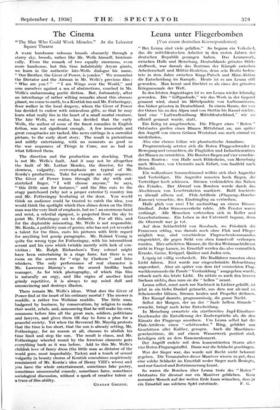The Cinema
"The Man Who Could Work Miracles." At the Leicester Square Theatre A DARR handsome colossus broods obscurely through a starry sky, broods, • rather like Mr. Wells himself, histrioni- cally. From the remark of two equally enormous, even more handsome, but this time indubitably Aryan giants, we learn in the authentic late-Wells dialogue his name. " Our Brother, the Giver of Power, is yonder." We remember the Dictator and the Airman in Mr. Wells's previous film : " Who are you ? " " I am Wings over the World," and arm ourselves against a sea of abstractions, couched in Mr. Wells's embarrassing poetic diction. But, fortunately, after an interchange of rather wilting remarks about this obscure planet, we come to earth, to a Kentish inn and Mr. Fotheringay, floor walker in the local drapery, whom the Giver of Power has decided to endow with miraculous gifts, so that he may learn what really lies in the heart of a small mortal creature. The, late Wells, we realise, has decided that the early Wells, the author of some of the finest comedies in English fiction, was not significant enough. A few immortals and great conspiracies are tacked, like news cuttings in a surrealist picture, to the early short story. The result is pretentious and mildly entertaining, with no moments as good as the war sequences of Things to Come, nor as bad as what followed them.
The direction and the production are shocking. That is not Mr. Wells's fault. And it may not be altogether the fault of Mr. Lothar Mendes, the director, for the slowness, vulgarity, over-emphasis are typical of Mr. Korda's productions. Take for example an early sequence. The Giver of Power leans through the sky with out- stretched finger. " I will choose anyone," he says, " this little man for instance," and the film cuts to the stagy pasteboard (why not a proper exterior ?) country inn and Mr. Fotheringay hesitating at the door. You would think an audience could be trusted to catch the idea, you would think the spotlight which then shines down on the little man was the very limit of emphasis, but no ! an enormous hand cm.d. wrist, a celestial signpost, is projected from the sky to point Mr. Fotheringay out to dullards. For all this, and for the deplorable miscasting, Mr. Wells is not responsible. Mr. Korda, a publicity man of genius, who has not yet revealed a talent for the films, casts his pictures with little regard for anything but gossip paragraphs. Mr. Roland Young is quite the wrong type for Fotheringay, with his intermittent accent and his eyes which twinkle merrily with lack of con- viction : Mr. Ralph Richardson's Tory colonel might have been entertaining in a stage farce, but there is no room on the screen for " wigs by Clarkson " and false whiskers. The only performance of real character is Mr. Lawrence Hanray's as the scared birdlike bank manager._ As for trick photography, of which this film is naturally an orgy, and like orgies of another kind grimly repetitive, it is always to my mind dull and unconvincing and destroys illusion.
There remain Mr. Wells's ideas. What does the Giver of Power find at the heart of his ordinary mortal ? The answer is muddle, a rather too Weilsian muddle. The little man, badgered by business, by conservatism, by religion to make their world, rebels, and, announcing that he will make his own, summons before him all the great men, soldiers, politicians and lawyers, and gives them till day to form a plan for a peaceful society. Yet when the Reverend Mr. Maydig protests that the time is too short, that the sun is already setting, Mr. Fotheringay, for no reason at all, chooses -to abolish his time limit and stop the sun. The result is chaos, and Mr: Fotheringay wheeled round by the ferocioutt -elements puts everything back as it was before. Add to this Mr. Wells's childish Jove of fancy dress (the little man as dictator of the world goes, most improbably, Tudor) and a touch of sexual vulgarity (a beauty chorus of Kentish concubines suspiciously reminiscent of Mr. Korda's idea of Henry VIII's wives) and you have the whole entertainment, sometimes fake poetry, sometimes unsuccessful comedy, sometimes farce, sometimes sociological discussion, without a spark of creative talent or
a trace.of film ability. • GRARAM GREENE.






































 Previous page
Previous page